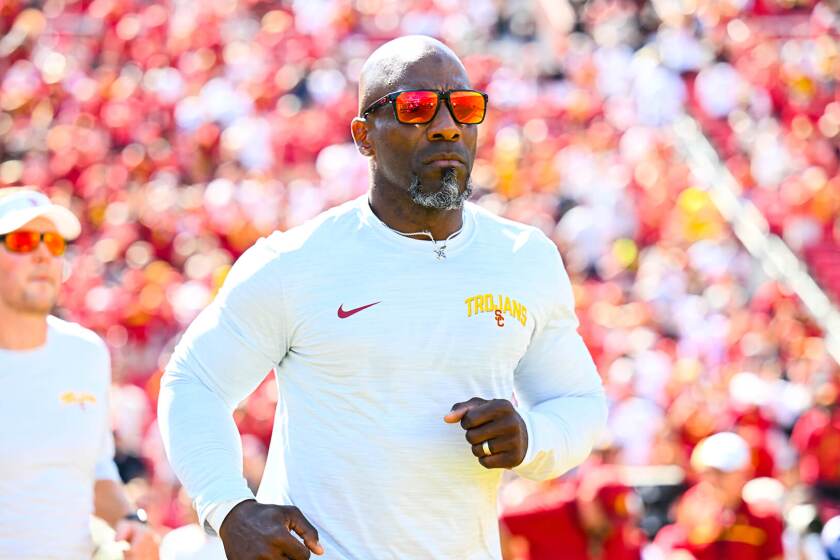USC Losing Mind Games?
- Share via
Five straight losses in 1999. Five straight losses in 2000. Now four in a row.
No one on the USC football team talks about the losing streaks. The players invariably shake their heads and insist this season is different from the ones that came before.
“There is no sign of quit in anybody, no sign of being scared,” fullback Charlie Landrigan said. “There’s no sign of selfishness, which can happen when you lose.”
But at 1-4, the Trojans are off to their slowest start since 1958, when Don Clark was the coach and they ran the “go-go-go” offense. They have never suffered five-game losing streaks in three consecutive seasons, not once in more than a century of playing the game.
“I refuse to believe guys on that team aren’t thinking about a five-game losing streak in the dark recesses of their mind,” clinical psychologist Drew Yellen said. “If you could push the erase button in their heads, that would be great, but you can’t.”
Yellen is a former Los Angeles high school football coach who specializes in sports psychology. He and other experts in the field said prior negative experience not only weighs on an athlete’s thoughts, it can affect performance, interrupting the composure that allows an athlete to read and react quickly.
“Players start to overanalyze,” said Leonard Zaichkowsky, a professor of sports psychology at Boston University. “While you’re thinking, the other guy is flying by you.”
Theories differ on how to overcome this dynamic.
Though much of the sports world is infatuated with the notion of positive mental imagery--see yourself catching the touchdown pass and you will catch it--Yellen preaches confronting worrisome thoughts head on. “That’s not negative thinking, it’s realistic thinking,” he said.
In his work, he asks athletes to verbalize and assess their fears, separating reason from superstition. Then, they discuss appropriate responses.
“Bring it up to the conscious level and deal with it,” he said. “Otherwise it will fester like an infection.”
USC Coach Pete Carroll, who studied psychology as a graduate student at Pacific in the early 1970s, said he has not talked to his players about the losing streaks.
He has watched, however, to gauge how they respond to each successive defeat. They have not seemed disillusioned or confused, as they often did last season. There is other evidence of the clean break to which his players often refer.
All four losses have come against teams that were unbeaten at the time, teams that are now ranked in the Top 25. All of the losses have come by less than a touchdown. With the exception of the first half against Stanford, the Trojans have shown signs of improvement in areas such as pass defense, special teams and the running game.
So Carroll has tried to build on small successes, working one-on-one.
“Motivation is an individual thing where you try to find the one thing that you can spark [a player] with,” he said. “Trying to do it with a whole group is difficult so I just try to do it on an individual basis.”
That can be an effective way of pulling a team from a slump, said Zaichkowsky, who has followed Carroll’s career since the coach was with the New England Patriots in 1997. “I think Pete is good at staying positive and showing confidence in his players,” he said.
Zaichkowsky also suggests trying to simulate pressure situations in practice as a way of getting players past any doubts about performing in the clutch. The Trojan coaching staff has talked about increasing the intensity in practice, making players compete for starting positions, but that has been problematic on a team that has suffered key injuries and lacks depth at many positions.
In the meantime, at least one assistant coach has quietly pulled aside veterans and warned them against conveying any “here we go again” comments to underclassmen.
As the Trojans head into a five-game stretch that includes several opponents with losing records, and none who are nationally ranked, the players seem to have rejected the notion that last season, or the one before, has any influence on what happens this fall.
“There are always going to be people who think like that,” tight end Alex Holmes said. “Whenever I speak to them, I try to influence them not to.”
More to Read
Go beyond the scoreboard
Get the latest on L.A.'s teams in the daily Sports Report newsletter.
You may occasionally receive promotional content from the Los Angeles Times.






